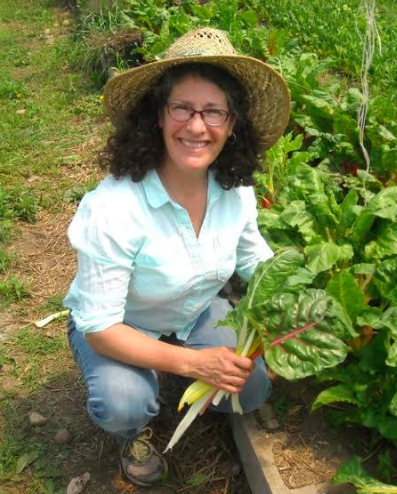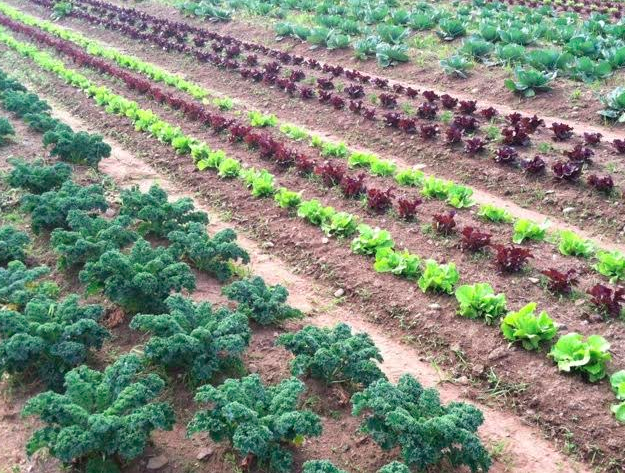 BY BARRY WARNER
BY BARRY WARNER
Several years ago, activists and local officials maneuvered to preserve 25 acres of the historic Cropsey Community Farm in New City. Almost half of that area [12 acres] is currently farmed using organic and sustainable methods by the Rockland Farm Alliance, a participant in the Community Supported Agriculture (CSA) program.
The nonprofit farm is also home to summer camp programs for kids, 50 laying hens, goats, ducks and bees. Many who contribute to Crospey’s activities are volunteers, including this week’s Volunteer of the Week, Kathy Rauth, a longtime educator whose service is focused largely on Cropsey’s camp for kids.
Volunteer educator Kathy Rauth told the Rockland County Times, “Rockland Farm Alliance’s Junior Farmers’ Summer Camp introduces children to sustainable agriculture, healthy living and understanding the environment through discovery and getting their hands dirty working on the farm. Children are led through farming workshops, planting, harvesting, bug hunts, beekeeping workshops, raw cooking activities plus arts and crafts. Gardening with children is a great physical development activity as they can practice motor skills as they move from one place to another carrying tools, soil and water. Also, it’s a great way to teach environmental awareness by exploring the workings of nature. Children are curious, like to learn by doing and can experience satisfaction that comes from caring for something over time.
“Journaling on the farm is healthy, because is combines mental stimulation and physical activity, allows time for mindfulness of the surroundings, deepens observational skills by using all five senses and is a multi-disciplinary activity that can incorporate science, language arts and math. For students entering grades K-2, Summer Camp introduces them to science and develops their connection to the natural world. For children entering grades 3-5, Summer Camp deepens their understanding of patterns within our ecosystems through foraging walks, study of wildlife working in harmony with the farm and field games.”
 Sustainable agriculture is the production of plant and animal products, including food, in a way which uses farming techniques that protect the environment, public health and the welfare of animals. Sustainable agriculture allows people to produce and enjoy healthy foods without compromising the ability of future generations to do the same. The key to sustainable agriculture is finding the right balance between the need for food production and the preservation of environmental ecosystems.
Sustainable agriculture is the production of plant and animal products, including food, in a way which uses farming techniques that protect the environment, public health and the welfare of animals. Sustainable agriculture allows people to produce and enjoy healthy foods without compromising the ability of future generations to do the same. The key to sustainable agriculture is finding the right balance between the need for food production and the preservation of environmental ecosystems.
In conventional farming methods, before seeds are sown, the farmer will have to treat his farm by using harsh chemicals to exterminate any naturally existing fungicides. The farmer will fertilize the soil using petroleum based fertilizers. The organic farmer will prepare and enrich the land before sowing by sprinkling natural-based fertilizers, such as manure, bone meal or shellfish fertilizer.
Before planting seeds, the conventional farmer will soak the seeds in fungicides and pesticides to keep the insects and pests away. The organic farmer will not soak the seeds in any chemical solution or irrigate the newly planted seeds using water with added chemicals. The organic farmer will depend on natural rain or stored water for use during the dry months. When the seeds have sprung up and it is time to get rid of the weeds, the conventional farmer will use chemicals to eradicate the weeds. The organic farmer can use animals to eat away the weeds.
Executive Director Shar Olivier indicated that Community Supported Agriculture members buy shares in advance of the growing season to help finance the seed, planting, equipment and labor costs of farming. In return, they are guaranteed a share of the farm’s harvest. A CSA share generally includes 8-10 items and is sufficient to feed a family of four for a week. An early season share will include greens, spring onions, garlic and radishes. At mid-season, shares include tomatoes, corn, squash, peppers and eggplant. At the end of the season, members receive such items as cabbage, broccoli and cauliflower.
Vegetables are for sale at the Nyack Farmers’ Market on Thursdays, at Cropsey Community’s Farm Market on Saturdays during the season and at Hungry Hollow Co-op in Chestnut Ridge. Food Deserts are areas that lack access to affordable fruits, vegetables, whole grains and other foods that make up a full and healthy diet. Low income areas are often the sites of Food Deserts because they lack large retail food markets and have a higher number of convenience stores, where healthy foods are less available. Therefore, thousands of pounds of healthy produce from the Cropsey Community Farm are donated annually to local charitable organizations.
For additional information about volunteering, visit www.rocklandfarm.org or call 845-634-3167.

You must be logged in to post a comment Login